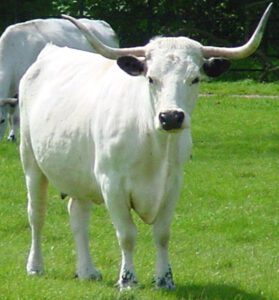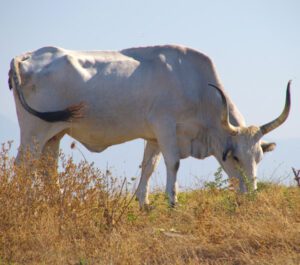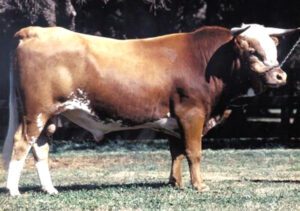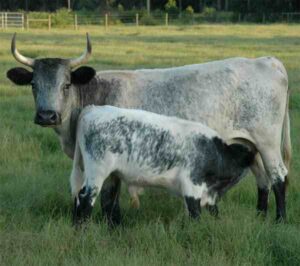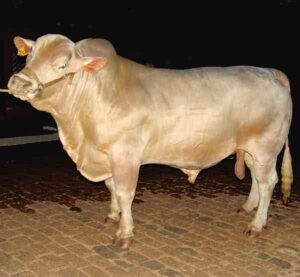The Braunvieh cattle were originally a triple-purpose breed of cattle which were used for milk and meat production and also used as a draught animal.
But at the modern times, the breed is mainly used as a beef cattle breed. Braunvieh is actually a group of breeds of domestic cattle originating in Switzerland and distributed throughout the Alpine region.
It derives from the grey-brown mountain cattle which were raised from the mediaeval times in the Swiss Canton of Schwyz in Central Switzerland.
Documents from the late fourteenth century at the Monastery of Einsiedeln record the export of such cattle to Vorarlberg, which is now part of Austria.
A description from 1795 of Schwyzer cattle calls them them the largest and finest of the country. First known herdbook for the Braunvieh cattle was established within 1775 to 1782.
The breed was shown at the International Exhibition of 1862 in London, and at the Exposition Universelle of 1855 in Paris. The breed is also known as Brown cattle, and as Bruna Italiana Vecchio Ceppo in Italy.
It was exported to the United States in around 1870 and was exclusively bred for milk production.
The modern American Brown Swiss breed was developed from this breed. Read more information about the breed below.
Braunvieh Cattle Characteristics
Braunvieh cattle are medium to large animals. They are usually uniform brown or grey-brown in color. Their nose is black and encircled by a pale ring.
Both bulls and cows usually have horns, and their horns are pale with dark points.
Average body height of the Braunvieh cows vary from 138 to 152 cm, and the bulls are pretty larger in size than the cows.
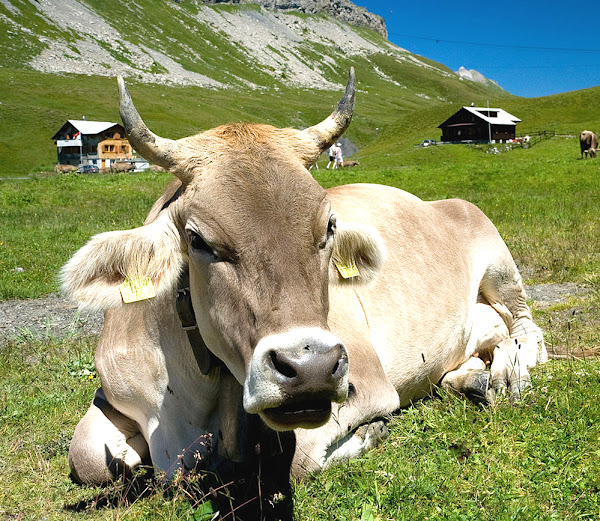
Average live body weight of the mature bulls is between 1000 and 1300 kg. And average live body weight of the mature bulls vary from 550 to 750 kg. Photo and info from Wikipedia.
Uses
The Braunvieh cattle were originally a triple-purpose breed. But today they are used for specific purposes depending on the raising area. They are good for both milk and meat production.
And also suitable for using as a draught animal. They are raised mainly as a dairy animal in some areas, and for meat production in some areas.
Special Notes
Braunvieh cattle are very hardy animals and they are very good for using as a draught animal. And they are also good for both milk and meat production. They are used as a dairy breed in some areas.
The cows are pretty good milkers. And depending on the location, average milk production of the cows vary form 7,200 to 12,000 kg. Their milk is of pretty good quality, containing about 3.5-4.5 percent of fat protein content.
The Braunvieh cattle are also used for crossbreeding. And they have given rise to several European cattle breeds in the Alpine region, in Italy, in Germany, in Austria and in Spain.
And as well as the Brown Swiss in the United States. Currently the breed is available worldwide. However, review full breed profile of the Braunvieh cattle in the following chart.
| Breed Name | Braunvieh | |
| Other Name | Also known as Brown cattle, and as Bruna Italiana Vecchio Ceppo in Italy | |
| Breed Purpose | Milk, meat and draught | |
| Special Notes | Strong, well adapted to local climates, good for meat, good for milk, good for draught purposes | |
| Breed Size | Large | |
| Bulls | 1000-1300 kg | |
| Cows | 550-750 kg | |
| Climate Tolerance | Native climates | |
| Coat Color | Uniform brown or grey-brown | |
| Horned | Yes | |
| Milk Yield | Very good | |
| Rarity | Common | |
| Country/Place of Origin | Switzerland |

